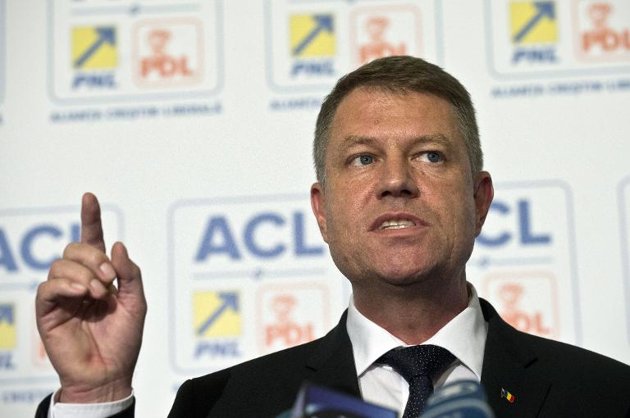Hours after pulling off Romania’s biggest political earthquake since the revolution which overthrew Nicolae Ceausescu, the country’s soft-spoken new president followed through Monday on his vow to tackle corruption.
Klaus Iohannis, the ethnic German mayor of the medieval Transylvanian city of Sibiu, won a shock second-round election victory on Sunday by defeating the heavily-tipped Prime Minister Victor Ponta, with whom he must now work in what could be a fraught cohabitation.
The two men appeared to be on a collision course with Iohannis insisting that parliament throw out a law Ponta supported for an amnesty for politicians and judges accused of corruption.
Ponta, who easily won the first round on November 2, was forced earlier this year to backtrack on a law that would have given politicians and government officials immunity from prosecution.
The election was seen as pivotal for the second poorest country in the EU as it struggles to overcome an entrenched culture of corruption.
– ‘Corrupt politicians’ –
Tens of thousands of people took to the streets between the two rounds of voting to support anti-corruption prosectors from the DNA office, and to condemn “corrupt” politicians.
Ponta’s ruling Social Democrats have blocked corruption probes into contracts with Microsoft and the aircraft giant EADS and refused to lift the immunity of several party members.
Iohannis, leader of the centre-right Liberal Party, campaigned on anti-graft platform to turn Romania into a “normal” country.
Political analyst Radu Alexandru said his “historic” win was a “victory of the people against a system run by the political parties in their own interests”, and a boost for democracy in central Europe amid a rising tide of authoritarianism, particularly in neighbouring Hungary.
Iohannis, 55, who faced accusations of not being a “real Romanian”, comes from the German-speaking minority, which now numbers less than 36,000 people.
Most left the country after the collapse of communism after suffering decades of persecution under Ceausescu.
But Radu said after turning the tables on the ruling party, the rigorous but uncharismatic Iohannis could find himself in a tricky stand-off with 42-year-old Ponta.
The previous cohabitation between Ponta and right-wing President Traian Basescu was so stormy it often brought the work of government to a standstill.
Iohannis — who had more than 54 percent of the vote with almost all ballots counted — has promised this will not be the case this time.
– Diaspora vote key –
Analyst Radu Magdin said the votes of the three million Romanians who live abroad had a huge impact on the results.
He said Iohannis’ win was a not just a “massive anti-Ponta” vote, but a backlash against the authorities contempt for the diaspora, thousands of whom claimed they were stopped from voting in the first round.
Professor Alina Mungiu Pippidi, of the Hertie School of Governance in Berlin, said the “involvement of Romanians abroad was a major step forward, because they cannot be bought and they know another Europe.”
Only 160,000 Romanians abroad were able to cast their ballots in the first round due to a lack of polling stations in countries including France, Germany and Britain.
But on Sunday, long queues of voters snaked outside polling stations in Paris, London and several other European cities.
In the evening, thousands were still waiting to vote in some cities, sparking renewed anger at the way the vote has been organised.
Police used tear gas to disperse hundreds of angry would-be voters at the Romanian embassy in Paris, who said they had not been able to cast their ballot.
In Bucharest, several thousand people took to the streets in solidarity with expatriates they said were being prevented from voting.

COMMENTS
Please let us know if you're having issues with commenting.